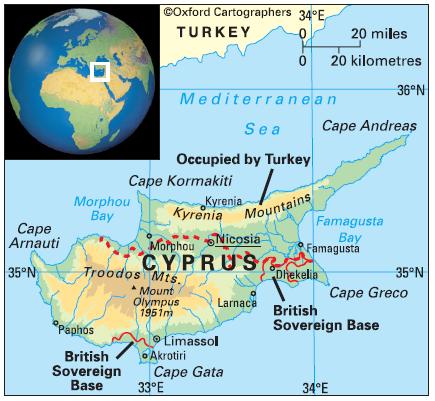Education in Cyprus
Joined Commonwealth: 1961
Population: 871,000 (2009)
GDP p.c. growth: 2.2% p.a. 1990-2009
UN HDI 2010: world ranking 35
Net primary enrolment: 99.1% (2009)
Net secondary enrolment: 95.5% (2009)
Gross tertiary enrolment: 52.0% (2009)
Adult literacy: 97.9% (2009)
Public spending on education was 6.9% of GDP in 2008. There are nine years of compulsory education starting at age six. The occupied north also has free education to the age of 15. Gross enrolment ratio for all levels of education combined is 85% (2009) witha primary female-male ratio of 0.99:1 and a secondary female-male ratio of 1.01:1 (2009). The pupil-teacher ratio for primary is 14:1 and for secondary 10:1 (2009). Some 95% of pupils complete primary school (2007). The school year starts in September.
Greek Cypriots have one of the world’s highest proportions of graduates. The University of Cyprus is a bilingual (Greek and Turkish) university which opened in 1992. Other tertiary institutions include the Higher Technical Institute (founded 1968), Forestry College, School of Nursing, Higher Hotel Institute and Mediterranean School of Management (postgraduate), as well as other, non-state universities. The female-male ratio for gross enrolment in tertiary education is 0.44:1 (2009). There is virtually no illiteracy among people age 15-24 (2006).
The state provides education and training for children with special needs, starting at the age of three and continuing until the completion of the education and training process.
Public and semi-public non-formal education is provided through the Apprenticeship Training Scheme. Technical education evening classes are administered by the Ministries of Labour and Education and delivered by adult education centres. Cyprus Adult Education Association, an NGO working to promote adult education and international co-operation, works with the adult education centres throughout the country. Accelerated vocational training and re-training courses are run by the Industrial Training Authority.
Public kindergartens are entirely financed by the state. The government pays the salaries of the teachers and assistants, and meets educational materials and running expenses, and the costs of construction and maintenance of school buildings. Children aged 4 years and 8 months to 5 years and 8 months attend public kindergartens free of charge; younger children must pay small fees.



